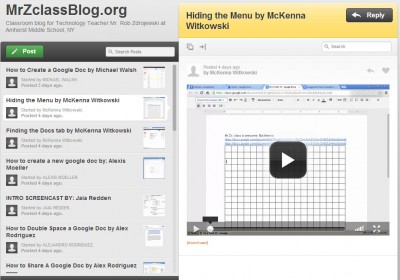Domestic, Interview, K-12, Required, Teachers, Technology - Written by Wired Academic on Monday, November 26, 2012 6:00 - 0 Comments
Interview With Rob Zdrojewski: Unleash Digital Natives (Students) To Train Teachers In Tech
By Sarah Butrymowicz, The Hechinger Report
Billions of dollars are spent annually for on-the-job teacher training. Often, schools hire outside contractors to run workshops on teaching strategies, new policies like the Common Core State Standards, and—increasingly—how to use technology in the classroom. But one Buffalo technology teacher has found a much cheaper way to train his colleagues in all things digital. Rob Zdrojewski, a teacher at Amherst Middle School, has transformed his students into teachers. They create video mini-lessons, which help train the school’s teachers on how to use computers and other devices and software in the classroom. The Hechinger Report talked with Zdrojewski to find out more about how he’s capitalizing on the knowledge of “digital natives” to transform professional development.
Q: How did the idea to involve students in professional development come about?
A: The basic premise is teachers are very busy people. They don’t have a lot of time to meet all together in one room. We learn best when we have access to things on our own time—daytime, evenings, weekends, whenever we can get to it. The theory is let’s break down topics like how do we use Google Docs, how do we use Google Calendar in videos that are 60 seconds or less. I started out mentioning this to our faculty and they gathered up the most needed topics. Since I teach my seventh and eighth graders these skills and how to use these tools, I thought, why not have them, after they learn it, create a screen-cast where they’re going to wear a headset, their voice will be recorded, their mouse movements recorded. The student would do the task in 10 to 20 seconds and maybe give some rationale about why it’s a good tool to use. What we want to do is show the teachers not just how you would do it but why you would do it.
We did it on a small scale with one class of kids last year just to see how things would work. The real benefit here is the kids are creating these things for the teachers, but teachers don’t have to feel intimidated and admit that they don’t know how to do something that is seemingly basic to a kid. It’s kind of odd for teachers to learn from their students, but this way they can do it in a nonthreatening, non-intimidating way on their own schedule. It’s on-demand, available-anytime professional development as opposed to the traditional model where it’s sit-and-get, whether you’re ready for it or not.
Do you have any sort of technology professional development now? Is this replacing something?
It’s brand new. There’s only about four to five full-day staff development days in the school year. Increasingly those have now been blocked up with the [new] teacher evaluation system, with the new Common Core [State] Standards, with common assessments. In the past we could afford to have an hour or a half-day of technology-based training. Now that all seems to be pushed by the wayside because of these other priories we’re focusing on. The need developed itself, because we don’t want to just push it away and pretend it doesn’t exist. Teachers are asking to be trained on things. Let’s make ourselves available digitally so that when they’re ready to learn, they know where to go, watch the videos and then they can ask questions at that point if something doesn’t make sense.
How much does this cost?
 There is free software out there but we’re choosing a paid solution because it has some advantages. The cost roughly is $29 per [computer]. Once we have that software in my classroom – I have 23 computers – now we have the ability to create and unlimited number of videos. Since I already have my students with me and one of our learning goals is learning how to screen-cast, it’s kind of like two birds with one stone. A student learns how to use this digital tool and now to prove that they’ve learned it, they’re going to become the teacher.
There is free software out there but we’re choosing a paid solution because it has some advantages. The cost roughly is $29 per [computer]. Once we have that software in my classroom – I have 23 computers – now we have the ability to create and unlimited number of videos. Since I already have my students with me and one of our learning goals is learning how to screen-cast, it’s kind of like two birds with one stone. A student learns how to use this digital tool and now to prove that they’ve learned it, they’re going to become the teacher.
What’s the reaction been from students and teachers?
I didn’t think the kids would be as excited as they are to make them. I thought they’re going to say, “Oh Mr. Z is having me do some work for somebody else to benefit.” But it’s really not been the case. The kids are excited because they know that their teachers, potentially a lot of them, are going to watch and learn from them and hear their voices. So the kids will act it up a little bit and say, “Hi everybody out there in the world, I’m going to have a fun time today showing you how to make a new Google Doc.” It becomes an exciting thing for them to be a teacher to an unknown audience.
The teachers thought it was great. Some of them are saying, “I was able to check it out on a Saturday afternoon. I was able to check it out during my planning period. I was able to look at it with a student in my class.” It’s truly anytime, anywhere learning and from any device. Teachers have pulled out [their iPhones] and said, “I was able to check this out while I was waiting in line with the supermarket. I would have never thought standing in a supermarket line I could learn something that would benefit me and my job.” But having the right tools and the right place, it’s now possible.
This interview has been edited for length and clarity. It was produced by The Hechinger Report, a non-profit journalism organization housed at Columbia University in New York.
Campus Buzz
We welcome Tips & Pitches
Latest WA Original Features
-
“Instreamia” Shakes Loose Moss By Launching Spanish Language Mini-MOOC
-
Jörn Loviscach: A German Math Teaching Sensation Emerges On YouTube & Udacity
-
Open University Enters Battle Of The MOOCs, Launches “FutureLearn”
-
Alvaro Salas As A Case Study In Crowd-Funding An Ivy-League Education
-
Jonathan Mugan: How To Build A Free Computer Within A Computer For Your Child
Paul Glader, Managing Editor
@paulglader
Eleni Glader, Policy Editor
Elbert Chu, Innovation Editor
@elbertchu
Biagio Arobba, Web Developer
@barobba
Contributors:
Michael B. Horn
@michaelbhorn
Derek Reed
@derekreed
Annie Murphy Paul
@AnnieMurphyPaul
Frank Catalano
@FrankCatalano
Ryan Craig
@UniVenturesFund
Jonathan Mugan
@JMugan
Terry Heick
@TeachThought
Alison Anderson
@tedrosececi
Ravi Kumar
@ravinepal

The Pulitzer Prize winning investigation newsroom digs into for-profit education.
-
Most Viewed
- Inside Ashford University: A former staffer talks to WiredAcademic
- Infographic: A History Of Information Organization From Stone-Age To Google
- Davos: 12-Year-Old Pakistani Prodigy Girl Talks About Her Online Learning
- Open University Enters Battle Of The MOOCs, Launches "FutureLearn"
- Pearson Llc + Google Expands LMS Business With "OpenClass" System
-
MARKET INTRADAY SNAPSHOT
- Education & Tech Companies We Follow
| APEI | 40.20 |  -0.17 -0.17 |  -0.42% -0.42% | ||
| APOL | 19.01 |  +0.33 +0.33 |  +1.77% +1.77% | ||
| AAPL | 460.16 |  -6.43 -6.43 |  -1.38% -1.38% | ||
| BPI | 10.74 |  -0.09 -0.09 |  -0.83% -0.83% | ||
| CAST | 0.11 |  +0.01 +0.01 |  +10.00% +10.00% | ||
| CECO | 4.08 |  -0.02 -0.02 |  -0.49% -0.49% | ||
| COCO | 2.40 |  -0.02 -0.02 |  -0.83% -0.83% | ||
| CPLA | 32.03 |  -0.41 -0.41 |  -1.26% -1.26% | ||
| DV | 30.69 |  +0.36 +0.36 |  +1.19% +1.19% | ||
| EDMC | 4.03 |  +0.07 +0.07 |  +1.77% +1.77% | ||
| ESI | 18.34 |  +0.04 +0.04 |  +0.22% +0.22% | ||
| GOOG | 792.89 |  +5.07 +5.07 |  +0.64% +0.64% | ||
| LINC | 6.20 |  +0.06 +0.06 |  +0.98% +0.98% | ||
| LOPE | 25.03 |  +0.36 +0.36 |  +1.46% +1.46% | ||
| PEDH | 0.45 |  0.00 0.00 |  +0.00% +0.00% | ||
| PSO | 18.51 |  -0.27 -0.27 |  -1.44% -1.44% | ||
| SABA | 8.61 |  -0.16 -0.16 |  -1.82% -1.82% | ||
| SCHL | 30.87 |  +0.46 +0.46 |  +1.51% +1.51% | ||
| STRA | 51.95 |  -1.54 -1.54 |  -2.88% -2.88% | ||
| WPO | 414.41 |  +5.35 +5.35 |  +1.31% +1.31% |
Domestic, For-Profit, Gainful Employment, Infographics, Personalized Learning, Private, Public, Required, Universities & Colleges - Jan 31, 2013 6:09 - 0 Comments
Infographic: To Get A Degree Or Not To Get A Degree? Here Is An Answer
More In For-Profit
- Ryan Craig: American Clampdown Forcing Forlorn For-Profit Colleges To Look Abroad
- How For-Profit Colleges Major In Marketing & Fail Education
- Infographic: A Graphical Profile Of Today’s Online College Student
- Infographic: A Comparison Of For-Profits v. Non-Profit Online College Data
- Opinion: How “Shareholder Value” Is Destroying For-Profit, Career Colleges
Cost of Education Domestic Education Quality Ethics For-Profit Friend, Fraud, or Fishy Gainful Employment Graduation Rates Legislation Minorities Opinion Recruitment Regulatory Required Retention Rates Student Loans Universities & Colleges
MOOCs, Required, Technology - Feb 16, 2013 10:04 - 0 Comments
MOOC Monitor: Must Reads This Week
More In Technology
- Infographic: Rise of the MOOCs
- Smart Cities Part II: Why DC Is The Planetary Hub Of Online Learning
- Five Questions: Polling EdTech Startup UnderstoodIt’s Liam Kaufman
- Infographic: The Future of Higher Education
- Anne Collier: Study Shows eBooks Gaining Larger Share & Boosting Overall Reading Habits
Domestic K-12 Parents Reading / Literature Required Technology
Charter, Cost of Education, Domestic, Education Quality, Friend, Fraud, or Fishy, K-12, Minorities, Regulatory, Required - Feb 7, 2013 12:23 - 0 Comments
Should For-Profit Companies Manage K-12 Schools? A Skeptical Review
More In Friend, Fraud, or Fishy
- A Letter To Sen. Tom Harkin About For-Profit Charter Schools
- Ryan Craig: American Clampdown Forcing Forlorn For-Profit Colleges To Look Abroad
- Opinion: The Problem With Deceptive Degree Aggregators In The Search For Online Courses & Degrees
- How For-Profit Colleges Major In Marketing & Fail Education
- Infographic: A Comparison Of For-Profits v. Non-Profit Online College Data
Cost of Education Domestic For-Profit Friend, Fraud, or Fishy Graduation Rates Infographics Recruitment Required Universities & Colleges

![[D] [D]](../../../3593/3333223048_009f61701f.jpg)


Leave a Reply